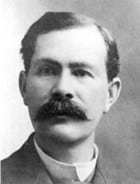By Fred O. Henker, M.D

By the late 1800s, the Little Rock medical community had grown immensely. Professional societies were forming – the Little Rock and Pulaski County Medical Society – and several members were promoting the founding of a medical school. One of these physicians was Dr. James A. Dibrell, Jr.
James was born Aug. 20, 1846 in Van Buren, Ark., one of three sons and four daughters of Dr. J. A. Dibrell, Sr., a pioneer physician renowned statewide for both clinical and administrative expertise as well as credited with formation of his county medical society and presidency of Arkansas Medical Society. All three sons became physicians.
James began his medical education under the tutelage of his famous father, working in an auditor’s office by day and studying at night. His father having lost all his holdings due to the Civil War, James had to earn his expenses and save for college. During the winter of 1867-68, he took a course of medical lectures at the Medical College of St. Louis and a course of lectures in the Department of Medicine at the University of Pennsylvania where he received his medical degree in 1870. He settled immediately in Little Rock and built a magnificent home at 1400 Spring Street. He soon earned recognition as a physician of remarkable ability and surgical proficiency. In 1878, he married Lallie Reardon of Little Rock. They had two sons, both of whom became noted physicians in Little Rock.
As was his father before him, Dr. Dibrell was active in medical organizations and here erupted a problem which threatened the founding of the medical school. Dr. Almon Brooks of Hot Springs applied for membership in the Little Rock and Pulaski County Society. Several prominent members, including Dr. P. O. Hooper, the dean of Little Rock physicians, found cause to resist his acceptance and withdrew from the Society, forming a counter society: The College of Physicians and Surgeons of Little Rock. Dr. Dibrell and his associates remained loyal to the original organization supporting Dr. Brooks. Feelings ran high and no progress was made toward the medical school. Eventually, Dr. Edwin Bentley, an Army physician stationed at Little Rock Barracks and friend of Dr. Hooper, arbitrated a settlement between the two groups and action on the medical school resumed. For capital, eight incorporators, including Dr. Dibrell, each subscribed to 25 shares of stock at $25 per share. The school opened Oct. 7, 1879, with Dr. Dibrell as a professor of anatomy. Dr. Hooper was dean until he resigned in 1886 to become superintendent of the Arkansas Lunatic Asylum, and Dr. Dibrell was elevated to the position of dean where he served ably until his death in 1904.
An interesting incident during Dr. Dibrell’s tenure as dean came when the A.M.C.A. enacted a requirement that as of 1905 applicants for medical school must possess a high school diploma before acceptance. Dean Dibrell sought to delay this action at the 1904 annual A.M.C.A. convention in Atlantic City. When he failed, he reluctantly resigned the College’s membership.
In addition to medical education, Dr. Dibrell was involved in a number of medically related activities including serving as the President of Little Rock and Pulaski County Medical Society, President of Arkansas Medical Society, Vice President of American Medical Association, physician to the Arkansas Deaf Mute Institute for 15 years, United States examining surgeon for pensions, physician for all three railroads serving Little Rock, Secretary of Arkansas Board of Health, Vice President of Mississippi Valley Sanitary Council, Secretary and then President of Little Rock Board of Health. He also maintained an active private practice. As a surgeon, his reputation was vast. He successfully performed many unusual operations and invented several surgical instruments of great value to the profession. His services were in demand not only throughout Arkansas but also in neighboring states.
As a person, Dr. Dibrell was sincere and unpretentious. He also demonstrated an uncommon empathy with his patients. He was said to be a philosopher by nature, a logical and precise scientist in his thinking, and a convincing public speaker.
Seemingly at the peak of his career, Dr. Dibrell died of pneumonia surrounded by his family at his home on November 11, 1904. Burial was in Little Rock’s Mt. Holly Cemetery. He was preceded in death by his wife Lallie in March 1899. His mother-in-law, who had lived in the home during his marriage, continued to do so after his death.
Dr. Dibrell served hundreds during his lifetime and now his efforts continue to benefit thousands every day through the University of Arkansas College of Medicine which he helped to found.
